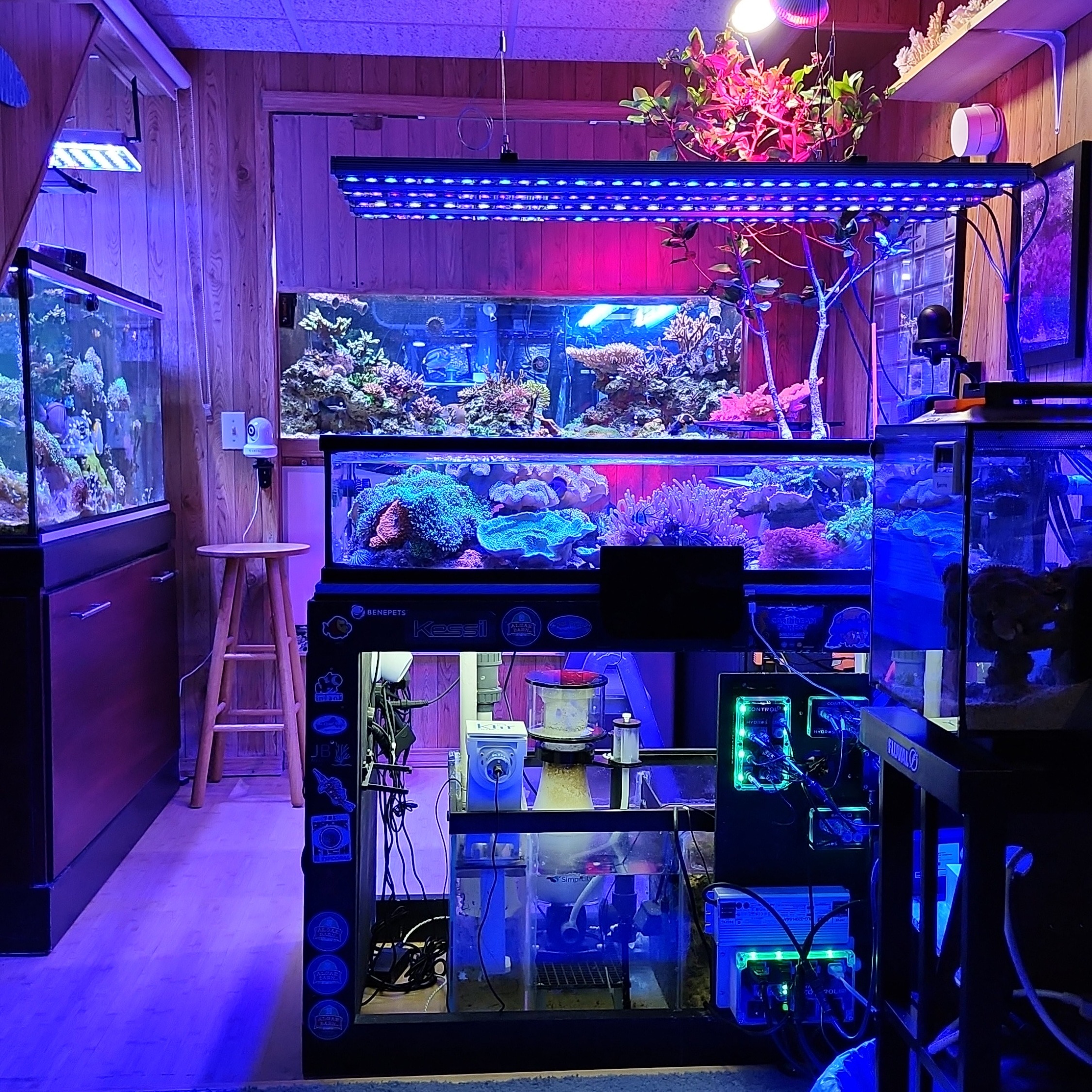
I have been in the saltwater aquarium hobby for over 35 years. Those of you with the same tenure can attest to the evolution of the hobby on all fronts, from hardware advancements to upkeep practices. The reefing community has grown more successful in the last two decades, but even with many advancements, I have seen many people come and go from this hobby all the time. Other than dropping out completely there can be an intermediary step that can be explored for those with multi-tank syndrome like me.
My system has grown a lot over the last 18 years in this house and highly impacted by “creeping elegance”. If I was able to afford all the equipment I currently have and built the system at a single point in time, I would have done everything very differently based on what I know today. This may be the time to reset to achieve a display system I would be more proud of. I have a lot to ponder.
There comes a time in your life when a change happens that will impact your current status quo relative to your hobbies. This can be related to finances, available time, or just simplifying lifestyle. I am not quite at that stage yet, but I want to plan for it. I ask myself, “What should I do to stay in this hobby, that has been huge part of my life, yet lower some of the stresses and resource consumptions it brings?” Knowing that I am a collector of things, it can be hard task to assess and let stuff go.
Nine saltwater and 1 freshwater tank currently operate in my house. The oldest aquarium in this house is 18 years old and maybe it is time to downsize or consolidate by upgrading to my final dream system. The first thing to do is to identify all my options and prioritize them based on what I want to achieve.
Options
Any hobby consumes money, time, and mental capacity. I am fortunate that I am not forced to make immediate rash decisions about it. Here are some of the transition steps, in my opinion, to lighten the load while staying in the hobby.
Automation
Automation will minimize some of the daily repeated tasks. It can monitor the health of the system if designed and configured properly. But this can cause a level of complacency for the hobbyist. The hobbyist should still stay in tune with the health of the system with careful observation of the livestock and all the hardware daily. Always have a reference image and/or data for when the system is working properly and at its peak so that that you will quickly identify things when they are different.
Automation can vary from something as simple as an Auto Feeder, Auto Top Off, or Fleece Filter, to a full controller system that monitors and controls all aspects including some water parameter testing and auto water changing.
I reiterate that automation is great when everything works as designed. Though this additional equipment will have their own problem sets and maintenance requirements. I have not found any solutions that are turnkey or error free to date. All types of technology will require troubleshooting skills that some are not willing or able to do.
Re-Aquascaping and Livestock Hardiness Shift
Re-aquascaping can reinvigorate the passion in the hobby. Along with that, a shift in livestock choices to hardier specimens can also reduce some care requirements. This reduces the need to meet special requirements that are tougher to uphold like tighter water parameters or feeding needs. For example, most corallimorphs and soft corals do not need the intense supplementation that stony corals require.
Livestock Care Levels
Switching over to a Fish Only with Live Rock (FOWLR) tank can still bring joy without intense water parameter upkeep. Fish disease mitigation and feeding will be the forefront to tackle with this type of system. Mitigate this with the right practices and careful livestock selection from quality LFS(s) but is simpler than care in a reef environment if treatment is necessary.
Focused Theme
Simplify to a system that is totally different from what you have been used to, such as a species-specific theme or biotope like jellyfish, seahorses/pipefish, etc. A singular focus also minimizes variables.
Unification
If possible, plumb multiple systems together to achieve larger water volume stability and reduce water management to a single system. This simplifies the water chemistry maintenance to a single system. Even a hybrid setup of using a controller to perform automatic water changes between each system to dilute contaminants is an improvement. Though water changes with fresh saltwater is still the golden standard.
Reduction/Consolidation
Reducing the number of tanks is a logical option to take if you have more than 1 system. This eliminates focus on multiple systems and the amount of consumables and effort required.
This may be my personal next step. At minimum I may need to replace my 18 year old 125 gallon Marineland with double corner overflows at some point just due to age. Because this is physically the largest aquarium I own, it makes it a bit more difficult to swap a new system into the same position. Also the fact that 5 tanks are plumbed into the same sump makes it a bit trickier. I would have to add a step to separate the other 4 systems from the this one sump. The 80g rimless, 40 breeder, and 12g Mr Aqua will be on the Trigger systems Emerald 34 sump. I will have to install my spare Trigger systems Ruby 36 sump under the 120g system to run independently. This is the opposite direction I want to go long term since I liked having a unified water system.
Scaling Down
Finally, if you are starting off with a single larger system, scaling down to a smaller system can bring efforts back down to more manageable levels in all areas of cost and time. It will be more limited in stocking choices and require more due diligence in planning.
One of the most enjoyable systems I have is just a 1.7 gallon pico planted Neocardina shrimp tank with some ember tetras sitting on my desk. It just requires a top off of some freshwater from evaporation and modest feeding. The Reef Casa Studio 12 Corallimorph tank is my 2nd favorite since it requires no dosing and is the most modern system I have.
- 1.7g Pico Neocardina Shrimp Tank
- 12g Mr Aqua LPS
- Reef Casa Studio12 Corallimorph Tank
- Fluval EVO 13.5 Soft Coral Tank
- Reef Mentoring Waterbox 30.2
- Deep Blue 80g Rimless and 40 Breeder Frag tanks
- 50g LowBoy
- 120g LPS
- 125g SPS
Summary
Whatever you decide to do, creating a list of your constraints and goals is the first step. Include the options you are willing to pursue and prioritize them based on investment effort. It’s the same when entering the hobby for the first time. It can reinvigorate your interest in the hobby while matching the lifestyle you want to achieve. Even if you downsize the number of operating systems, hold on to the remaining functional equipment (if storage space allows) for a short time before you think of selling or disposing them. This provides time to avoid regret or if a decision ended up not being what is expected.

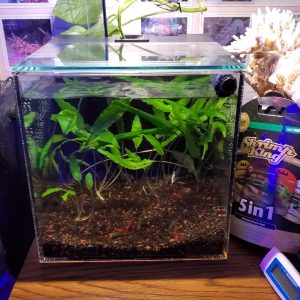
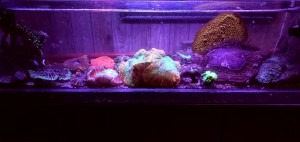
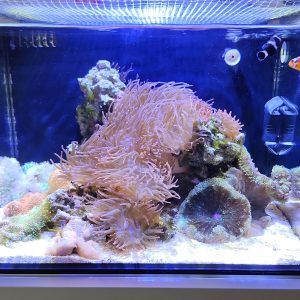
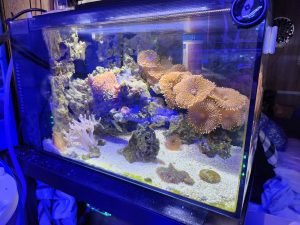
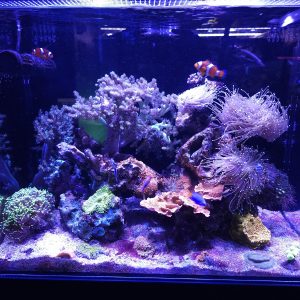
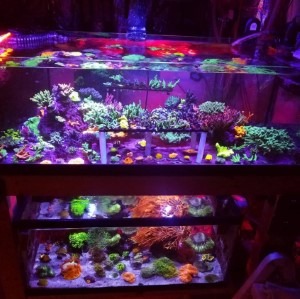
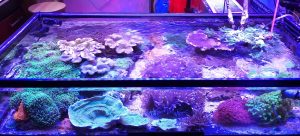
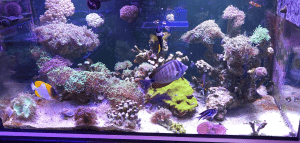
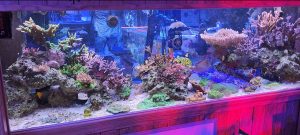








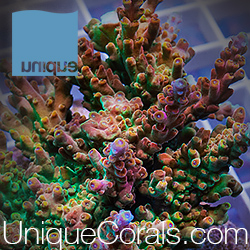
What a great post – thank you for taking the time. I was super into the hobby a couple of decades ago and “won’t let myself” get back in…been messing around with planted tank (fresh) but finding they are just as much work but not nearly as satisfying or beautiful, frankly!
Curious about the coralimorph tank….wonder if maybe THAT is the “relatively low maintenance” solution for me. Moderate lighting, not too picky about micronutrient dosing…hopefully could avoid algae without too much backbreaking effort (sure would love to use tap water, ours is very good!). Anyway thank you for the inspiration!